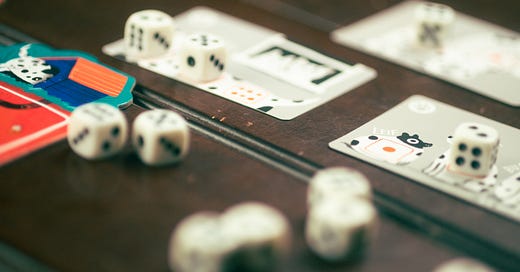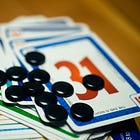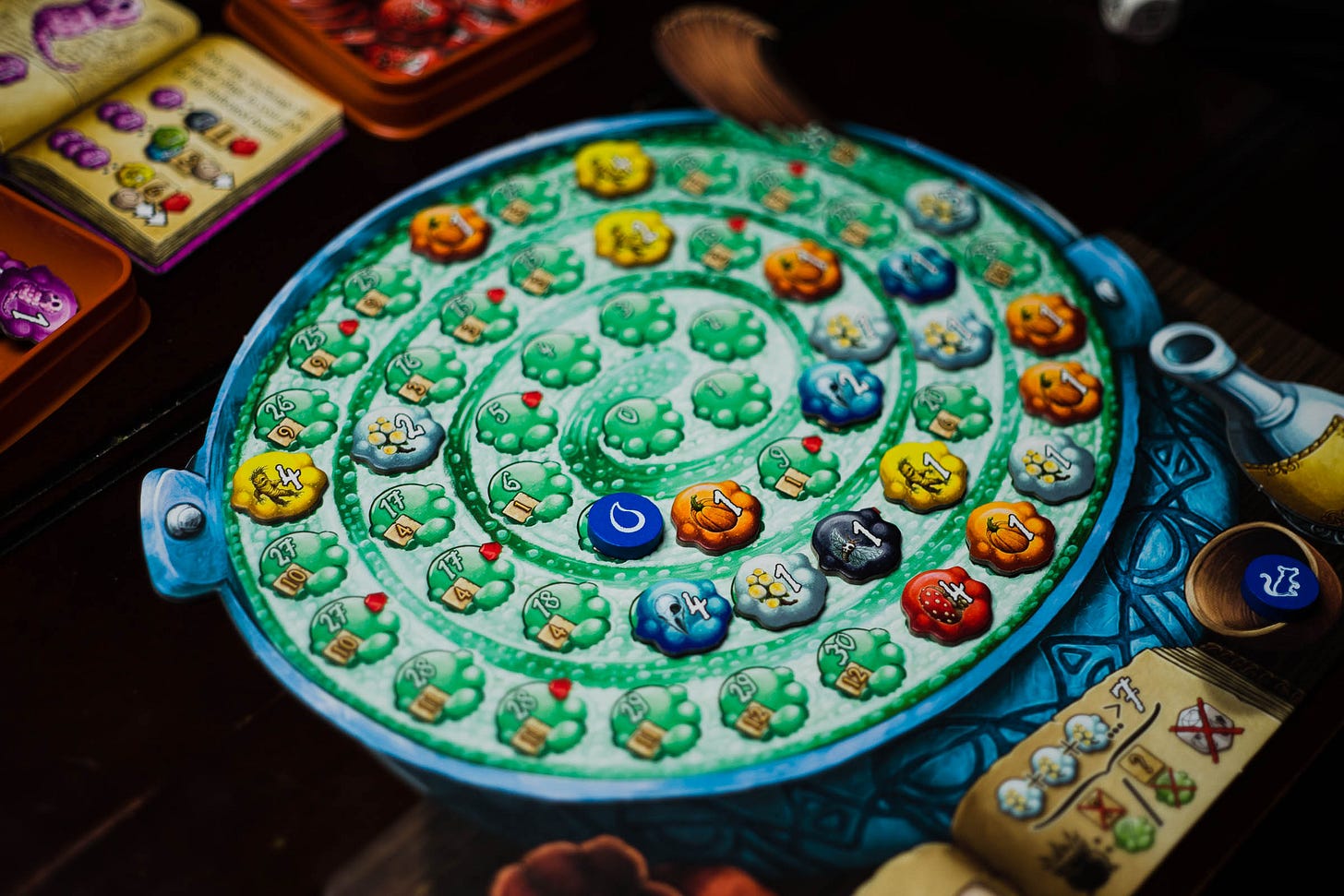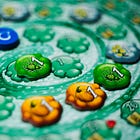It isn’t unusual among hobby games — at least among those that involve some sort of randomized input — that you’ll end up trying to push your luck. There are many games that feature the mechanic we call “push your luck.” Too many to name, really.
The games I’m more interested in here are those in which pushing your luck is the core conceit of the game. Are you rolling dice, hoping to avoid a certain value, but you can always continue to re-roll? Are you continuing to draw cards from deck, hoping that you won’t go over a defined limit? These are the sorts of games I’m talking about here.
As always, this is not an exhaustive list of great push-your-luck games. If you have suggestions, I’d love to hear them. Leave a comment, if you’d like. Or just email me. I don’t mind. (I love it, actually. I’m pretending to be cool about it, but I am decidedly not.)
Can’t Stop
Designed by one of the greatest designers to have graced the hobby, Sid Sackson’s Can’t Stop is an enduring fixture. In an industry where games come and go on an annual basis, enjoying success 44 years after release is an eternity. Perhaps its longevity comes because it distills the idea of pushing one’s luck into a rudimentary form.
In Can’t Stop, your goal is to move to the top of three columns, numbered 2 to 12, before any other player. On your turn, you’ll roll four six-sided dice, splitting them into pairs of your choosing, and you’ll move up the corresponding column for each pair with one of your three runners. You can then roll the dice again in a bid to advance your runners in those columns. And again, and again, until you’ve decided to stop, locking in your progress for the round. But if you ever can’t place or advance one of those three runners, you’ll lose all of that progress for the round.
Every time I play Can’t Stop, I end up rolling the dice far too many times, losing my progress over and over. But every now and again, I’ll end up in a very strong position as a result of my carelessness, and that feels amazing.
There are some excellent digital adaptations of the game, as well. I’ve got a game running on BGA with some friends constantly, and we start a new game every time one ends.
No Thanks!
I’ve written about No Thanks! more than a few times, and I wrote about it in some depth nearly one year ago.
This remains one of my favorite games to play with “non-gamers,” a term in which I don’t find a lot of value these days. (If somebody plays a game with you because they want to, not because of social obligation, does that make them a gamer? I digress.) In No Thanks!, each turn is simple: Decide if you want to take a card (numbered 3 to 35, with 9 taken out each game), giving you points (which are bad) as listed on the card; or decide to pass on a card, placing a token on it. The person who picks up the card gets the tokens, which are worth negative one point apiece, in addition to their standard use as a way to pass on a card. If you have a consecutive sequence of cards, you take only the lowest of that sequence as points.
The crux of the game comes down to this: Will you take the card, or will you spend your increasingly scarce resources? There’s something magical about this game. Every time I play this game with a new group, two things happen: First, somebody surprises me by taking a card at what I think is a poor value. Second, they beat me.
Spots
I hope you don’t mind if I quote myself on Spots. I don’t need to repeat myself too much.
“Dogs have spots. Dice have spots. Place your dice on the right spots.”
That’s how the rulebook opens, and it’s honestly it’s the best start to a rulebook I can remember. Spots is a push-your-luck, dice-chucking game. Each turn sees you taking one of the available actions, which might have you rolling two dice, three dice, eight dice or even 12 dice — there’s a lot of variety here. You might also take treats or pick up new dog cards. If you ever roll dice you can’t place on your cards (each dog has spots that show a standard die face on them), you have to bury them — and if you ever have more than a cumulative value of 7 buried, you’ll bust and lose all your dice, including the dice on unfinished dogs.
It’s a game that takes just a few minutes to teach, and I’d recommend reviewing the short summary on the back of the rulebook so you don’t miss anything — it’s short but descriptive. And once you get going, the fun’s right there. Everybody loves rolling dice, and this game has you rolling so many dice. So many.
Yeah. I still love this game.
The Quacks of Quedlinburg
Quacks. What a game. It’s simultaneously hilarious, nerve-wracking and exciting. Don’t get hung up on the mechanics of this one — sure, it’s a bag-building game, which is in the same family as deck building, but that’s not what makes The Quacks of Quedlinburg sing. No, this game works because every single time you dip your hand into a bag to pull out an ingredient for your potion, you’re risking moving one step closer to exploding. This is a game that works because you’re constantly pushing your luck, and trust me: You’ll feel it.
Six more great push-your-luck games
Welcome to the Dungeon is like a game of medieval fantasy chicken: Who will go into the dungeon with the least armor, and more importantly, will they survive?
Formula D is a great racing game with dice. You’ll start in first gear with just two values on your die: 1 and 2. As you get into higher gears, you’ll get dice with more facets to roll — but if you go too fast through turns, you’ll put yourself at risk of elimination.
King of Tokyo pits kaiju against each other as they try to maintain control of Tokyo. If you make it to Tokyo and choose to stay, you’ll be defending against everyone else playing — but you’ll also gain more victory points. Finding that balance is the premise of the game. I like it a lot.
Pandemic: The Cure takes the cooperative classic Pandemic’s idea and shoves it into a pretty compelling dice game. As you’re rolling to figure out what you can do on your turn, you can always re-roll — but re-rolling also increases the risk of an epidemic.
Lost Cities is a two-player card game in which you’re battling to more fully complete expeditions in five different suits. If you fail to score at least 20 points, you’re going to lose points. Further, you can make expeditions more lucrative with handshake cards, multiplying your final value — even if it’s negative.
Deep Sea Adventure has you competing to gather treasure beneath the sea in a submarine, but there’s a limited supply of air — and if it runs out, everyone loses. This is about finding the balance between taking treasure and preserving air, and striking that balance is tough.
As always, thank you for reading and being part of Don’t Eat the Meeples! I got some more newsletter-themed stickers today (although, because I am great at marketing, they don’t say the name of the newsletter. It’s just a big ol’ meeple.) — if you’re interested in getting a little envelope shipped to you, drop me a message (or use the referral program!) I’d love to get some of these out of my desk drawer and on to your water bottles.
Next week: A newsletter about nothing. We’re going to get a little weird.










